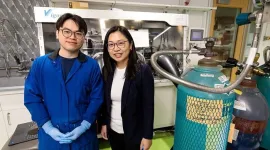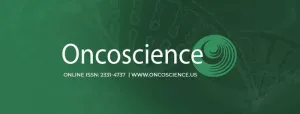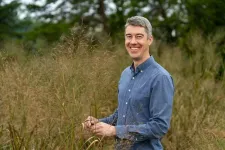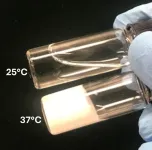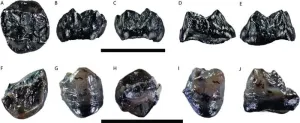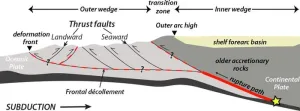(Press-News.org) Researchers at the University of Michigan are finding that many patients may be encountering significant barriers to cancer care, even from their first phone call to a clinic.
Patients attempting to access cancer care must go through several different levels of communication, both before their initial appointment with a physician and throughout their treatment.
Making those first calls to learn more about available cancer care services or to schedule an appointment at a clinic is an important step toward beginning their treatment journey.
“Racial and ethnic disparities have been observed in the outpatient visit rates for specialist care, including cancer care. However, we know very little about patients’ experiences at the critical step of attempting to access new clinic appointments for cancer care,” said Debbie Chen, M.D.
Researchers set up simulated patient calls and studied whether each caller was able to access cancer care – that meant whether the caller was provided with a clinic appointment date or scheduling information.
Using standardized scripts, the simulated patients spoke in one of three languages – English, Spanish, or Mandarin – and inquired about a new clinic appointment for colon, lung, or thyroid cancer care.
The simulated patients called 479 clinic phone numbers, which were provided by the hospital general information staff at 143 hospitals in 12 states.
Researchers found that access to new patient appointments for cancer care was poor for all simulated patient callers in the study – only 41.5% of the 985 total calls were successful.
Even the simulated English-speaking patient caller encountered challenges and were successful in accessing cancer care in only 61% of calls.
About one-quarter of the 985 calls ended early due to workflow barriers, which included calls going to a voicemail that did not provide adequate information, or being on hold for over half an hour.
In addition, researchers found that access to new patient appointments for cancer care was worse for non-English speaking patients.
The simulated Spanish- and Mandarin- speaking patient callers accessed cancer care in only 36% and 19% of the calls, respectively, far less than their English-speaking counterpart.
Nearly 50% of the calls made in Spanish or Mandarin ended due to language barriers when simulated patient callers were hung up on in response to asking “Speak Spanish?” or “Speak Chinese?”, or disconnected when the automated message did not provide language-specific instructions but required input to continue.
Even after getting connected to interpreter services, some callers were unable to receive further assistance.
"Our study highlights existing barriers that patients may encounter when attempting to access a new clinic appointment for cancer care and illustrates how this access point functions as a gatekeeper to cancer care services, with many patient populations, including patients with limited English proficiency, unable to even get in the door to see a physician for their cancer care” Chen said.
“Thus, interventions focused on mitigating these barriers are necessary to increase access to cancer care for all patients.”
This study was supported by the University of Michigan Rogel Cancer Center (Discovery Award to Dr Chen), National Institute of Diabetes and Digestive and Kidney Diseases (grant No. T32DK007245 to Dr Chen), and National Cancer Institute (grant No. K08CA273047 to Dr Chen).
The funders had no role in the design and conduct of the study; collection, management, analysis, and interpretation of the data; preparation, review, or approval of the manuscript; and decision to submit the manuscript for publication.
END
Accessibility issues in cancer care
Research identifies issues with booking new appointments at clinics for cancer treatment
2024-06-07
ELSE PRESS RELEASES FROM THIS DATE:
Research details method to get efficient, environmentally friendly lithium
2024-06-07
As the electric vehicle market booms, the demand for lithium — the mineral required for lithium-ion batteries — has also soared. Global lithium production has more than tripled in the last decade. But current methods of extracting lithium from rock ores or brines are slow and come with high energy demands and environmental costs. They also require sources of lithium which are incredibly concentrated to begin with and are only found in a few countries.
Now, researchers at the University of Chicago Pritzker School of Molecular Engineering (PME) have optimized a new method for extracting lithium from more dilute — and widespread — sources of the mineral, including seawater, ...
In new experiment, scientists record Earth’s radio waves from the moon
2024-06-07
On Feb. 22, a lunar lander named Odysseus touched down near the Moon’s South Pole and popped out four antennas to record radio waves around the surface—a moment University of Colorado Boulder astrophysicist Jack Burns hails as the “dawn of radio astronomy from the Moon.”
It was a major achievement for the tenacious lander, which was built by the Houston-based company Intuitive Machines and had to overcome a series of technical difficulties to make it to the lunar surface. Burns is co-investigator on the radio experiment that flew aboard Odysseus called Radio wave Observations at the Lunar Surface ...
Restoring our ubiquitination machinery to overcome resistance to cancer therapy
2024-06-07
“[...] the identification of ubiquitin-conjugating enzymes like UBE2J1 and the innovative deployment of PROTAC-type androgen receptor degraders are crucial in combating prostate cancer and overcoming therapeutic resistance.”
BUFFALO, NY- June 7, 2024 – A new editorial paper was published in Oncoscience (Volume 11) on May 6, 2024, entitled, “Restoring our ubiquitination machinery to overcome resistance in cancer therapy.”
In this new editorial, researchers Xiaoling Li and Ping Mu from ...
Sky’s the limit for biofuels
2024-06-07
The United States has enough biomass potential to produce 35 billion gallons per year of aviation biofuel by 2050, a new report confirms.
Oak Ridge National Laboratory’s John Field provided biomass feedstock production expertise to the report focused on the role of the bioeconomy in U.S. decarbonization strategies, which was produced by the Department of Energy’s DECARB program.
The report examined the role of biomass in reducing greenhouse gas emissions across the economy, including opportunities to reach negative emissions. It includes data ...
Nirmatrelvir-ritonavir and symptoms in adults with postacute sequelae of SARS-CoV-2 infection
2024-06-07
About The Study: The results of this randomized clinical trial showed that a 15-day course of nirmatrelvir-ritonavir in a population of patients with postacute sequelae of SARS-CoV-2 infection (PASC) was generally safe but did not demonstrate a significant benefit for improving select PASC symptoms in a mostly vaccinated cohort with protracted symptom duration. Further studies are needed to determine the role of antivirals in the treatment of PASC.
Corresponding Author: To contact the corresponding authors, email Linda N. Geng, M.D., Ph.D. (geng@stanford.edu) and Upinder Singh, M.D. (usingh@stanford.edu).
To ...
Stanford Medicine trial:15-day Paxlovid regimen safe but adds no clear long-COVID benefit
2024-06-07
In a clinical trial conducted by Stanford Medicine investigators and their colleagues, a 15-day course of Paxlovid — an antiviral drug combination targeting SARS-CoV-2, the virus that causes COVID-19 — proved safe as an extended-duration treatment but didn’t lessen select symptoms of the syndrome known as long COVID: the persistence, or reappearance, of COVID-related symptoms three months or more after an initial COVID-19 infection.
The findings are described in a paper to be published ...
Antioxidant gel preserves islet function after pancreas removal
2024-06-07
Northwestern University researchers have developed a new antioxidant biomaterial that someday could provide much-needed relief to people living with chronic pancreatitis.
The study will be published on June 7 in the journal Science Advances.
Before surgeons remove the pancreas from patients with severe, painful chronic pancreatitis, they first harvest insulin-producing tissue clusters, called islets, and transplant them into the vasculature of the liver. The goal of the transplant is to preserve a patient’s ability to control their own blood-glucose levels without insulin injections.
Unfortunately, the ...
Tiny new species of great ape lived in Germany 11 million years ago
2024-06-07
Ancient apes in Germany co-existed by partitioning resources in their environment, according to a study published June 7, 2024 in the open-access journal PLOS ONE by Madelaine Böhme of Eberhard Karls University of Tübingen, Germany and David R. Begun, of University of Toronto, Canada and colleagues.
The Hammerschmiede fossil site in Bavaria, Germany is best known for exceptional remains of the ancient great ape Danuvius dating to the late Miocene Epoch, 11.6 million years ago. Other experts contest the strength of the evidence to support whether Danuvius is a hominid or whether ...
Cascadia Subduction Zone, one of Earth’s top hazards, comes into sharper focus
2024-06-07
Off the coasts of southern British Columbia, Washington, Oregon and northern California lies a 600 mile-long strip where the Pacific Ocean floor is slowly diving eastward under North America. This area, called the Cascadia Subduction Zone, hosts a megathrust fault, a place where tectonic plates move against each other in a highly dangerous way. The plates can periodically lock up and build stress over wide areas―eventually to be released when they finally lurch against each other. The result: the world’s greatest earthquakes, shaking both seabed and land, and generating tsunamis 100 feet high or more. Such a fault ...
Unlocking another piece of the Parkinson’s puzzle – scientists reveal workings of vital molecular switch
2024-06-07
Scientists at the University of Dundee have uncovered the inner relay of a molecular switch that protects the brain against the development of Parkinson’s disease.
The research provides new potential strategies to develop drugs that may benefit patients with Parkinson’s.
Parkinson’s is the fastest growing brain disorder in the world, however, there are currently no treatments that can slow or arrest the condition.
Previous research conducted at the University had found a gene called PINK1 is central to protecting brain cells against stress. In patients ...
LAST 30 PRESS RELEASES:
ASU researchers to lead AAAS panel on water insecurity in the United States
ASU professor Anne Stone to present at AAAS Conference in Phoenix on ancient origins of modern disease
Proposals for exploring viruses and skin as the next experimental quantum frontiers share US$30,000 science award
ASU researchers showcase scalable tech solutions for older adults living alone with cognitive decline at AAAS 2026
Scientists identify smooth regional trends in fruit fly survival strategies
Antipathy toward snakes? Your parents likely talked you into that at an early age
Sylvester Cancer Tip Sheet for Feb. 2026
Online exposure to medical misinformation concentrated among older adults
Telehealth improves access to genetic services for adult survivors of childhood cancers
Outdated mortality benchmarks risk missing early signs of famine and delay recognizing mass starvation
Newly discovered bacterium converts carbon dioxide into chemicals using electricity
Flipping and reversing mini-proteins could improve disease treatment
Scientists reveal major hidden source of atmospheric nitrogen pollution in fragile lake basin
Biochar emerges as a powerful tool for soil carbon neutrality and climate mitigation
Tiny cell messengers show big promise for safer protein and gene delivery
AMS releases statement regarding the decision to rescind EPA’s 2009 Endangerment Finding
Parents’ alcohol and drug use influences their children’s consumption, research shows
Modular assembly of chiral nitrogen-bridged rings achieved by palladium-catalyzed diastereoselective and enantioselective cascade cyclization reactions
Promoting civic engagement
AMS Science Preview: Hurricane slowdown, school snow days
Deforestation in the Amazon raises the surface temperature by 3 °C during the dry season
Model more accurately maps the impact of frost on corn crops
How did humans develop sharp vision? Lab-grown retinas show likely answer
Sour grapes? Taste, experience of sour foods depends on individual consumer
At AAAS, professor Krystal Tsosie argues the future of science must be Indigenous-led
From the lab to the living room: Decoding Parkinson’s patients movements in the real world
Research advances in porous materials, as highlighted in the 2025 Nobel Prize in Chemistry
Sally C. Morton, executive vice president of ASU Knowledge Enterprise, presents a bold and practical framework for moving research from discovery to real-world impact
Biochemical parameters in patients with diabetic nephropathy versus individuals with diabetes alone, non-diabetic nephropathy, and healthy controls
Muscular strength and mortality in women ages 63 to 99
[Press-News.org] Accessibility issues in cancer careResearch identifies issues with booking new appointments at clinics for cancer treatment
